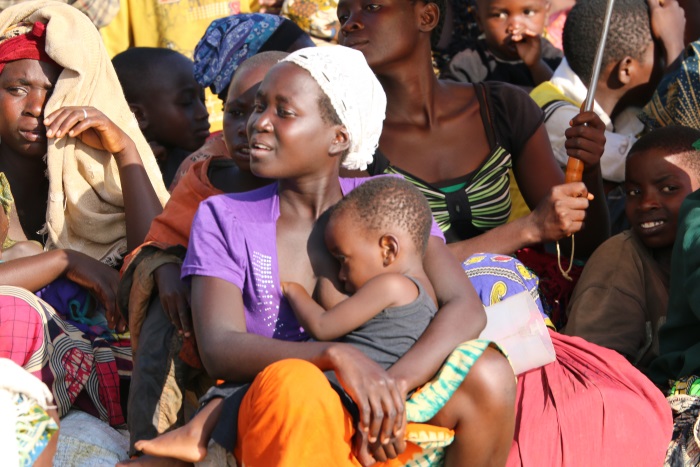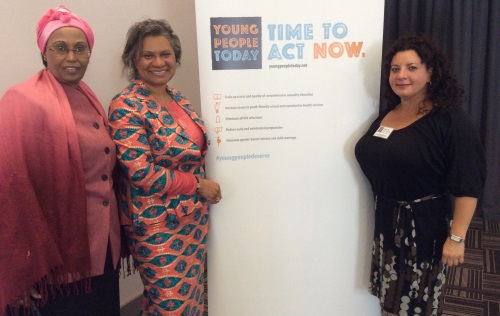Bissau, Guinea – Bissau - Five United Nations agencies are implementing together the H4+ Initiative , with funding from the Swedish Development Agency (SIDA), to accelerate progress towards achieving the Millennium Development Goals (MDGs) 4 and 5 i.e. reducing maternal mortality from 790 deaths to 228 deaths per 100,000 live births and infant mortality from 161 deaths to 70 deaths per 1,000 live births by December 2015.
The H4 + Initiative receives technical and financial support from UNFPA (United Nations Population Fund), UNICEF, WHO, UNAIDS and UNWomen, through the Inter-Agency Coordination by the UNFPA in Guinea- Bissau. Under the leadership of the Ministry of Health, the initiative is intended to help cover the financial resources’ shortfall.
The initiative contributes to the effective implementation of the National Health Development Plan (PNDS II 2008-2017), the Roadmap to reduce maternal and neonatal mortality (2007-2015), the CARMMA (Campaign for accelerated reduction of maternal mortality in Africa), the Investment plan to achieve the health MDGs and the Operational plan to scale to high-impact interventions in a bid to reduce the maternal, infant and newborn mortality.
The goals of the Initiative will be achieved by boosting the supply and demand of high-impact interventions in maternal, newborn and child healthcare in order to ensure quality care, good management and the availability of drugs and medical equipment.
The high-impact interventions include families and communities embracing essential family practices and the provision of a minimum package and a comprehensive set of services at different levels of the health pyramid: community level and health centres in regional hospitals.
The H4+ Initiative covers all regions in the country but focuses on the following priority regions: Bissauautonomous sector, Gabu, Bafata, Tombali, Quinara, Bolama and Bijagos.
It reinforces other ongoing initiatives in the country such as the Maternal and child health integrated programme (MCHIP) already existing in four health regions (Biombo, Cacheu, Oio and Farim).
Initiative H4 + Priorities
H4 + Initiative focuses on six priorities:
- Strengthening leadership and governance, particularly strategic management and coordination of interventions in the health sector;
- Providing Comprehensive Reproductive Health Care Services-CRHC for women and children through the provision of necessary equipment and supplies to health facilities;
- Providing health facilities with sufficient qualified personnel and improving the management of human resources to provide Comprehensive Reproductive Health Care Services to women and children;
- Strengthening the Health Information System (SIS), the monitoring and evaluation;
- Providing quality health care;
- Increasing demand for care, strengthening participation and community ownership.
Some H4+Initiative actions

With the support of the Initiative H4+, a workshop for the review of health indicators and the inclusion of a gender perspective was organized at the National Public Health Institute- INASA from 10th to 12th December 2013. Participants agreed on key indicators, the level of disaggregation, the calculation method and the inclusion of the gender perspective.
With technical and financial support from UNFPA, the Department of Reproductive Health Services has organized training workshops for 140 peer health educators in Bafata, Gabu, Oio, Farim, Quinara and Cacheu in August and September 2013.
During the training, participants worked on various topics including communication and awareness skills on sexuality, sexually transmitted infections including HIV/AIDS risk behaviours and the correct use of condoms.

Under the H4+ Initiative , a joint WHO, UNFPA, UNICEF and UNWomen mission visited on 5th and 6th December 2013 the regions of Quinara and Tombali to assess health conditions and identify these health regions’ priorities in order to develop an operational plan taking into account their specific needs and based on the model of the operational plan developed at the central level in Bissau.
After visiting the Buba hospital, the rehabilitation of the operating theatre was decided for it to be used for caesarean section and other surgeries.
Naçoes Unidas Guiné Bissau, UNFPA WCARO


